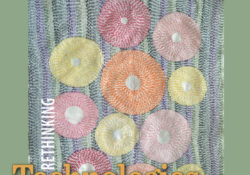eric.ed.gov har udgivet: This article reports the findings of a study designed to examine the influence of multimodal writing on the communication of mathematical ideas. Elementary school students (ages 8-13) were required to write mathematics notes using two digital writing technologies, a personal digital notepad and a social mathematics blog, in the context of a formal intervention. Forty-two students participated, across three schools. The study showed that when students wrote notes that could be assessed for correctness, their answers were predominately right, indicating that mathematical sense-making was taking place. It also showed that the digital notepad and blog were used differently and that the type of technology influences the writing content. Moreover, students’ mathematical writing were understandable by their peers and students collaboratively explored solutions. Younger students were more likely… Continue Reading →
Like this:
Like Loading...

tandfonline.com har udgivet en rapport under søgningen “Teacher Education Mathematics”: ABSTRACT ABSTRACT Digital technologies have been developed for postgraduate students to help them to access data and published research, write their dissertations, and communicate with their supervisors. In South Africa, the COVID-19 pandemic has compelled masters students to make greater use of digital technologies to ensure continuity and productivity under government-imposed lockdown at home. In previous studies, students have been observed to use digital technologies to address professionalisation or socialisation experiences at the expense of personalisation experience. This qualitative case study of five master’s students explores their experiences of using digital technologies during the COVID-19 lockdown. The participants were purposively selected from a larger sample of 14 students who participated in the researcher’s doctoral study. Semi-structured interviews, focus group discussion… Continue Reading →
Like this:
Like Loading...
eric.ed.gov har udgivet: The 2012 study, “Longitudinal Evaluation of a Scale-Up Model for Teaching Mathematics with Trajectories and Technologies,” examined the effects of “Technology-enhanced, Research-based, Instruction, Assessment, and professional Development (TRIAD),” a math intervention for preschoolers that combines a curriculum, a software-based teaching tool, and in-person teacher professional development. “TRIAD” is designed for young children, particularly those at risk of low math achievement. The study also included an assessment of whether continuing the intervention through kindergarten improved math achievement at the end of kindergarten. To measure these effects, two versions of the intervention were delivered: (a) “TRIAD” no follow-through (“TRIAD-NFT”), where children only received “TRIAD” in preschool; and (b) “TRIAD” follow-through (“TRIAD-FT”), where children received “TRIAD” in both preschool and kindergarten. Forty-two schools from Buffalo, NY, and Boston, MA were… Continue Reading →
Like this:
Like Loading...
eric.ed.gov har udgivet: This study aims to determine the attitudes of prospective teachers of Secondary Mathematics Education toward Instructional Technologies and Material Development (ITMD) Course. The participants of this descriptive research include 44 students, who take ITMD Course at Department of Secondary Mathematics at Necatibey Faculty of Education in Balikesir University. The questionnaire developed by researchers was conducted before and after the course at 2007-2008 fall semesters. The accuracy of the difference in the attitudes of the prospective math teachers before and after the course was tested by t test and it was seen to be statically significant in the level of p=0.05. Moreover, according to results of the interviews, the prospective teachers emphasized that ITMD Course aims to provide permanent learning and to prepare materials that are appropriate to… Continue Reading →
Like this:
Like Loading...
tandfonline.com har udgivet en rapport under søgningen “Teacher Education Mathematics”: Rethinking Technologies of Making Link til kilde
Like this:
Like Loading...
tandfonline.com har udgivet en rapport under søgningen “Teacher Education Mathematics”: ABSTRACT ABSTRACT This paper identifies important technological, financial, and equity challenges to the development and implementation of online or onscreen educational testing. The insights are based on the author’s experiences in New Zealand of being the senior project manager for the Assessment Tools for Teaching and Learning (asTTle) computer-based standardised testing system. The system was funded by the government for formative educational purposes and is delivered to schools for free. The issues faced in the project that need to be considered in any new online testing system include: clarity about the purpose of the testing system, the importance of knowing the current technology conditions, the challenges of working within the dynamic and changing world of technology, the need to assure… Continue Reading →
Like this:
Like Loading...
tandfonline.com har udgivet en rapport under søgningen “Teacher Education Mathematics”: Link til kilde
Like this:
Like Loading...



